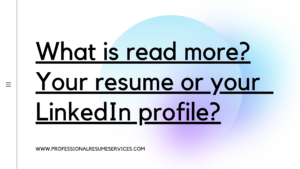
I would say at least in more than half of the conversations I have with job seekers, they end up asking me if they should have their LinkedIn profile written, or just their resume?
What do hiring managers read the most? The resume or a LinkedIn profile?
The answer is BOTH.
Resumes and LinkedIn profiles are both important because they serve different but complementary purposes in the job search process.
A resume is a formal document that is used to summarize a job candidate’s work experience, education, skills, and other qualifications for a specific job application. It’s usually submitted to an employer as part of the application process.
LinkedIn, on the other hand, is a professional networking platform that provides a digital presence for job seekers. It allows candidates to connect with potential employers, recruiters, and other professionals in their industry, as well as showcase their work experiences, skills, and accomplishments through their profile.
Together, a strong resume and LinkedIn profile can help a job candidate to present a complete and compelling picture of their qualifications and expertise to potential employers.
The resume provides detailed information about a candidate’s experience, while the LinkedIn profile provides context, endorsements, and network connections that help to bring the candidate’s qualifications to life.
A resume helps a job seeker to do the following four things:
- Summarize work experience and qualifications: A resume provides a concise overview of a job seeker’s work experience, education, skills, and other qualifications, making it easier for employers to quickly assess a candidate’s suitability for a job.
- Stand out from other candidates: A well-crafted resume can help a job seeker to stand out from other candidates by highlighting their strengths, achievements, and unique qualifications.
- Make a positive first impression: A professional-looking and well-organized resume is crucial in making a positive first impression on potential employers.
- Target specific job opportunities: A job seeker can tailor their resume to match the requirements and qualifications listed in a specific job posting, making it easier for them to show how their experience and skills align with the needs of the employer.
A LinkedIn profile helps a job seeker to do the following four things:
- Build a professional network: LinkedIn allows job seekers to connect with potential employers, recruiters, and other professionals in their industry, which can lead to job opportunities and career growth.
- Showcase expertise and achievements: LinkedIn provides a platform for job seekers to highlight their work experience, skills, and accomplishments, helping them to stand out from other candidates and demonstrate their value to potential employers.
- Stay up-to-date in the industry: LinkedIn is a source of news and information about the job seeker’s industry, allowing them to stay informed about the latest trends and developments in their field.
- Expand their visibility: By having a strong LinkedIn profile, job seekers can increase their visibility and be discovered by potential employers and recruiters, even if they are not actively searching for a new job.
A resume provides a formal document that summarizes a candidate’s work experience, education, skills, and qualifications for a specific job application, while a LinkedIn profile provides a digital presence that allows job seekers to connect with potential employers, recruiters, and other professionals in their industry, showcase their expertise and accomplishments, and expand their visibility.
Having both a well-crafted resume and LinkedIn profile helps job seekers to present a complete and compelling picture of their qualifications and expertise to potential employers, increasing their chances of being considered for job opportunities. By having both, job seekers can also target specific job openings, stand out from other candidates, make a positive first impression, and stay up-to-date in their industry.
In conclusion, having both a LinkedIn profile and a resume is crucial for job seekers as they serve different but complementary purposes in the job search process.
What do you think is most important? What gets more interest– your resume or your LinkedIn profile?








